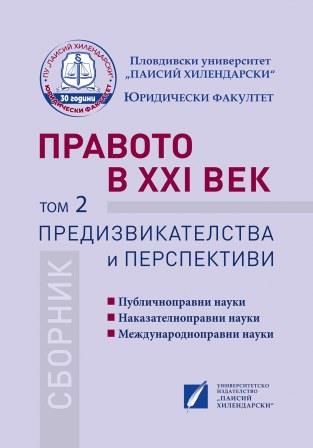Предизвикателства и перспективи при определяне на приложимото законодателство по смисъла на дял II от регламент №833/2004 в условията на работа от разстояние или хибридна работа
Challenges and Prospects in Determining Applicable Legislation within the Meaning of Title II of Regulation (EC) №833/2004 in Remote Working Conditions or Hybrid Work
Author(s): Siyana Dimitrova
Subject(s): Law, Constitution, Jurisprudence, Civil Law, EU-Legislation, Administrative Law
Published by: Пловдивски университет »Паисий Хилендарски«
Keywords: applicable legislation; telework; Member State; social security systems; legal framework; guidelines
Summary/Abstract: This report addresses some challenges in determining applicable legislation within the meaning of Title II of Regulation (EC) No 883/2004 in remote working conditions or hybrid work and the prospects for applying the legal framework in relation to the guidelines given by the European Union (EU) in Administrative Commission for the Coordination of Social Security Systems Note AC125/22REV2. The COVID-19 crisis has changed the world, but it has also thoroughly changed our way of working, workplace and the employer-employee relationship. How has work changed during the global pandemic, and what will it look like in the future? People quickly figured out how to work from home. Тhe prevalence of telework has significantly increased across the world, including Europe. This, surely, applies to those employees who work across borders as well. These people no longer perform some or any of their activities in the Member State in which their employer is established, instead, they work/ed online in the Member State in which they reside, or in another Member State. Administrative legal regime concerning the coordination of Social Security Systems and application of the related Regulations faced a new challenge. Taking into account the need to assess the general interpretation of the existing legal framework, the European union (EU), by Note АС 125/22 REV2, introduced new guidelines on the application of social security systems for people, who work remotely and the application of policies for telework or hybrid work. Finding and implementing successful working patterns during the time of global crisis turned out to be not only a solution today (de lege lata), but also a prospect for a better solution tomorrow (de lege ferenda), because according to a number of researches the future belongs to the remote and hybrid work and it is supposed to remain part of the working patterns of many employees and companies with such policies to be rated as a preferred employer.
Book: Правото в XXI век
- Page Range: 198-203
- Page Count: 6
- Publication Year: 2023
- Language: Bulgarian
- Content File-PDF

